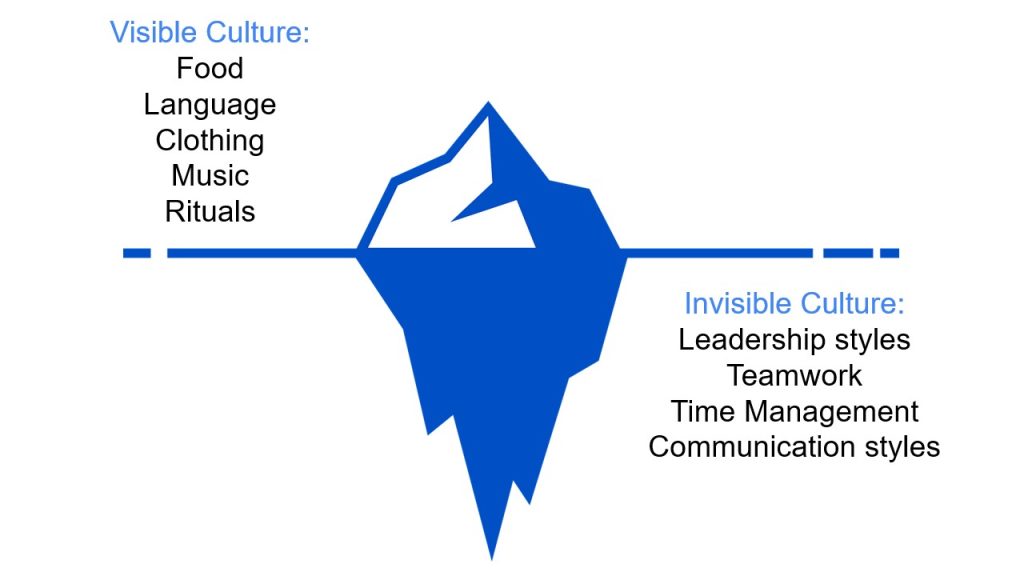5 Cultural Diversity
Cultural Diversity
Rebecca Hiebert
Across cultures, human beings share some universal habits such as eating and sleeping and these habits are biologically and physiologically based, not culturally based. Culture is the unique way that we have learned to eat and sleep based on our background. Other members of our culture have taught us slowly and consciously (or even subconsciously) what it means to eat and sleep. The way we behave is based on our cultural experiences.
While you read, consider the following:
- What information is new?
- What did I used to think?
- How can I use this information to welcome others?
The culture that we grew up in has dictated the value systems that we have. Values are deeply felt and often serve as principles that guide us in our perceptions and behaviours. Using our values, certain ideas are judged to be right or wrong, good or bad, important or not important, desirable or not desirable. Our culture dictates how we perceive common values such as fairness, respect, integrity, compassion, happiness, kindness, creativity, curiosity, religion, wisdom, and more.
Our values are supported by our assumptions of our world. Assumptions are ideas that we believe and hold to be true. Beliefs come about through repetition. This repetition becomes a habit we form and leads to habitual patterns of thinking and doing. We do not realize our assumptions because they are ingrained in us at a subconscious level. We become aware of our assumptions when we encounter a value or belief that is different from our own, and it makes us feel that we need to stand up for, or validate, our beliefs. When we meet someone from a different culture who has different values from us, we may judge them harshly. Furthermore, we may make the assumption that all people from that culture are the same; however, this is incorrect as each person is unique and has their own personal experiences within their culture. In this way, we can think of each of us as being a culture of one.[1]
Exercise
Reflect on these questions:
- What values do I have because of my culture?
- What different values might others have because of their culture?
- How might these values make it difficult to work together? What can I do?
Culture as an Iceberg
The ability to recognize and understand your own cultural context is seen as an essential prerequisite for understanding and interacting with people from different cultural backgrounds. An iceberg is often used as a metaphor for culture. On the surface we are able to see the more obvious aspects of culture, such as language, clothing, or food; however, there are many more aspects that lie deeper and require time and critical thinking to comprehend, including values such as leadership skills and teamwork expectations.

When we begin to recognize the complexity of culture, it becomes apparent that ways of thinking about culture that tend to oversimplify, reduce, and homogenize cultures are inadequate. If we are interested in understanding our own culture and in learning about the cultures of other people, we need to develop an awareness of how our own culture has affected our choices and behaviour and how other people’s cultures have affected their choices and behaviours.[2]
Culture Shock
When a person moves to a new place with a new culture they may experience culture shock. Culture shock is associated with feelings of uncertainty or confusion because a person becomes immersed in a culture that is unfamiliar to them. This can sometimes lead to feelings of anxiety or stress and make it difficult for the person to adapt to their new home.
Culture shock can take on may different stages. At first you may be excited by all the new things that you get to experience in the new culture, but as this excitement wears off you may begin to feel frustrated with the differences in communication styles and the miscommunications occurring with others. Over time, you may begin to adjust to the culture as you become more familiar with the beliefs, values, and social practices of your new location. Eventually, you will adapt to this new culture and feel more comfortable and at ease in your surroundings.[3]
Key Takeaways
Culture is what we learn from our family and community. It influences visible features (such as dress, language, food, and religion) and invisible features (such as our values around teamwork, leadership, body language, and communication styles). When we move to a new culture, this can cause us to experience culture shock because our unique values may not align with those of the new culture. When interacting with others in college, recognize the diversity of culture in your classmates and be open to adapting your expectations to bridge culture gaps.
- Intercultural Communication for the Community College by Karen Krumrey-Fulks. Licensed under a Creative Commons Attribution-NonCommercial-ShareAlike 4.0 International License. Disclaimer: Work in progress. https://www.oercommons.org/courses/intercultural-communication-for-the-community-college/view ↵
- Intercultural Learning: Critical preparation for international student travel by Peter Jones; Debra Miles; and Narayan Gopalkrishnan. Licensed under a Creative Commons Attribution-NonCommercial-ShareAlike 4.0 International License. https://open.umn.edu/opentextbooks/textbooks/intercultural-learning-critical-preparation-for-international-student-travel ↵
- Creating Intercultural Communication Competence by Tammera Stokes Rice. Licensed under a Creative Commons Attribution-NonCommercial-ShareAlike 4.0 International License. Adapted from p. 81: https://www.oercommons.org/courses/creating-intercultural-communication-competence ↵

